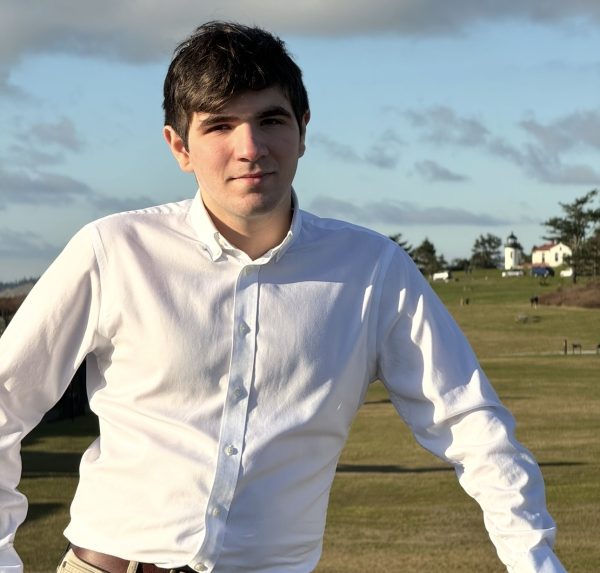On Thursday, Nov. 21, following several months of deliberation within the Board of Trustees’ (BoT) ad hoc committee and continued actions across campus coordinated by Mac for Palestine, President Suzanne Rivera announced that the BoT had reached a decision on the student group’s divestment proposal. In a unanimous vote, they decided not to adopt the proposal and instead “approve[d] a series of institutional investments in peacemaking and conflict resolution,” per Rivera’s email sent to students, faculty and staff.
Among these investment initiatives are funding for lectureship series and summer internship opportunities for students, as well as “scholarship aid for admitted students from violent conflict areas, with an initial focus on Palestinian students from areas of conflict, including the Middle East,” according to the Board’s statement.
In response, Mac for Palestine issued a statement on their Instagram page calling the Board’s decision “not just a rejection of divestment; it is a rejection of us, the Macalester community.”
In this post, they also introduced a Google Form petition calling for a vote of no-confidence — a rejection of the BoT’s authority to refuse divestment — by faculty and for Macalester to hold a vote on financial divestment open to all students, trustees, faculty and staff.
In effort to circulate their demands, Mac for Palestine held a sit-in in Weyerhaeuser’s Boardroom from 12 to 4:30 p.m. on Friday, Nov. 22. Following, protesters yelled “hey trustees, you can’t hide, you’re committing genocide,” among other chants, and listened to speeches delivered by students, alumni and former Macalester staff at a rally on the Great Lawn outside Weyerhaeuser from 4:30 to 5:30 p.m.
The BoT detailed the rationale behind their decision, highlighting that it “has a fiduciary responsibility to invest the college endowment in a manner that serves to maximize the resources of the college to support its mission.” This mission includes the college’s ability to support operations such as faculty and staff salaries and financial aid for students. Investment earnings that come from the college’s endowment make up approximately 30 percent of the college’s operating budget.
In their proposal, Mac for Palestine demanded that the college divest from 11 listed companies with financial ties to Israel. In their report, the Board said that, with the information provided by Macalester’s professional investment advisor, the college had no investment exposure to four of those companies.
For the other seven — in which the college has indirect investment — the Board described the exposure as “negligible” and added that it is not held through shares in those companies but instead “highly diversified market instruments” such as market index funds and equity portfolio investments.
In an interview with The Mac Weekly, BoT Chair Carrie Norbin Killoran ’94 explained that, given the nature of index funds, the college could not choose to remove those seven specific companies from their portfolio without divesting from those funds entirely. Index funds invest small shares of money in a wide range of companies, and are managed by outside organizations constantly adjusting the exact companies being invested in.
According to Norbin Killoran, the Board’s decision to pursue these peacebuilding investments over divesting the college’s endowment assets was also informed by the question of what would constitute a “constructive” and “impactful” response. She stated that the planned investment initiatives felt more in line with Macalester’s role as an educational institution that values justice and peaceful conflict resolution.
“There was kind of the practical piece of ‘is this even feasible and doable for us to do?’” Norbin Killoran said. “I think what was more important, though, was a feeling of ‘if we are going to take an action, we don’t want it to be just purely symbolic,’ which I think divestment would be. … As noted in our report, Macalester selling its few shares in seven companies is not going to change what happens on the ground.”
Norbin Killoran felt that in the months leading up to the decision, the Board engaged in a careful deliberation process and prioritized opportunities to hear community members’ perspectives surrounding the proposal.
“The ad hoc committee spent time really crafting their position on this and their recommendation to the Board,” Norbin Killoran said. “The Board then had multiple [feedback] sessions and multiple meetings to recognize that there’s a smaller group that’s been deeply steeped in this, and make sure that the full Board had an understanding and appreciation of the complexity of the issue and the nuance that’s involved with all of this.”
In their statement, the BoT expressed a commitment to greater transparency surrounding Macalester’s endowment investments, another central ask within Mac for Palestine’s divestment proposal. Out of the 680 funds to which Macalester’s endowment is tied, Mac for Palestine was only able to locate 132 while writing their proposal. While the proposal demanded that Macalester reveal all of their endowment funds to students, the Board’s statement emphasized that “there are contractual, practical, and other limitations on the college’s ability to provide the level of detail that some in the community desire.”
Norbin Killoran explained that the timeline and specific steps that the Board will take to fulfill this commitment currently remain unclear, due to Chair of the BoT Investment Committee Edward Donkor’s ’04 paternal leave. Reflecting on the Board’s commitment to increasing financial transparency during Fossil Free Mac’s divestment campaign, Norbin Killoran expressed hope to more effectively engage students in financial conversations.
Macalester has seen divestment proposals put forth by other student groups in previous years, including the ultimately adopted Fossil Free Mac’s 2021 proposal calling for the college to divest from Enbridge. However, Norbin Killoran noted that Mac for Palestine’s proposal differed from past proposals like this one in the diverse set of reactions it received from community members.
“The biggest difference [between the proposals] is the deep division within the community,” Norbin Killoran said. “When we were considering divestment from pipelines, … it was no new investment in pipelines. There was no one saying, ‘yay, pipelines are awesome. Let’s go do more, build more! Drill, baby drill,’ right? That was not the tenor of anyone in our community. In contrast, we received input that expressed very deeply felt opinions that were diametrically opposed to each other on this issue.”
Only a few hours after the BoT released their decision, members of Mac for Palestine attended Macalester College Student Government’s (MCSG) weekly meeting, which included a pre-scheduled visit from Rivera on the agenda. After several members of the Legislative Body (LB) offered their own questions and comments to Rivera, Mac for Palestine organizer OSB ’26 delivered a statement similar to the one posted on Mac for Palestine’s Instagram page.
“Standing in that room, looking at President Rivera as I read the statement just a few hours after myself finding out about the Board’s decision, was a truly emotional moment for me,” OSB wrote in an email to The Mac Weekly. “I wanted Rivera and the rest of the administration to hear me loud and clear: they do not get the final say. Mac for Palestine will not be silenced.”
“Delivering that statement was about making sure they understand that this fight is not a moment — it is a movement, and it will outlast their term and these decisions,” OSB continued in her email.
This sentiment reflects Mac for Palestine’s larger demands for what they believe would amount to a truly democratic vote on financial divestment. In addition to a vote including all students, faculty and staff, Mac for Palestine also included stipulations for the voting process to be anonymous, for Macalester to publish voting results “as votes are processed” and for Macalester to implement procedures to ensure all eligible individuals are able to cast a single vote.
After the MCSG meeting, members of Mac for Palestine remained in the boardroom for their sit-in until they moved outside to Great Lawn for their rally at 4:30 p.m.
At the rally, Claudia Taylor ’27 expressed disappointment and frustration regarding the Board’s decision, but they hold hope after seeing the community response following Mac for Palestine’s recent demands.
“I am excited about this no-confidence vote,” Taylor said. “I’ve never heard something like this before, but it sounds like a really good next step. … I think that we’ll keep pushing until we get this.”
OSB similarly sees the proposed no-confidence vote as part of an expanding mission for Mac for Palestine.
“Ultimately, our vision is not just about divestment — it’s about reimagining governance at Macalester so that it aligns with the community’s values and commitments to justice,” she wrote.
In her email to The Mac Weekly, OSB specifically identified Rivera’s actions specifically as a primary barrier to Mac for Palestine’s mission of achieving greater transparency and democratic decision making at Macalester.
“Rivera’s silence on key issues that threaten the safety and well-being of our community speaks volumes,” OSB wrote. “At this moment, right after Trump was reelected, many members of our campus — especially those most vulnerable — are facing unprecedented risks, yet her failure to take a clear stand demonstrates where her priorities lie. This lack of courage is emblematic of a broader failure of leadership at Macalester.”
Instead of focusing on the Board’s rejection of divestment from specific companies, Rivera emphasized the Board’s other commitments in the larger landscape of higher education for students disappointed with their decision.
“I understand that people who worked hard on the proposal may be frustrated because they didn’t get the result they hoped for,” Rivera wrote in an email to The Mac Weekly. “However, the concrete commitments made by the Board far exceed anything I’ve seen coming out of other higher education institutions and I believe they will have a much greater impact on the people affected by this conflict than the divestment that was suggested in the proposal.”
* Ella Stern contributed to the reporting for this story













